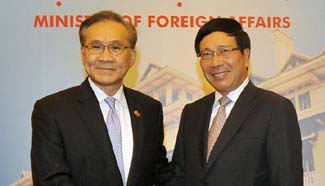BEIJING, July 8 (Xinhua ) -- A seven-year inquiry in Britain has brought the world focus again on the legitimacy of the U.S.-led invasion of Iraq in 2013.
The conclusion of the inquiry found that Prime Minister Tony Blair's decision to go to war in Iraq in 2003 was a failure born of flawed intelligence, lack of foresight and "wholly inadequate" planning.
Without a UN resolution authorizing the use of force, former U.S. President George Bush launched the invasion in March 2003, alleging the mission was "to disarm Iraq of weapons of mass destruction, to end Saddam Hussein's support for terrorism and to free the Iraqi people," which, however, turned out either to be false or unfulfilled.
The following is a list of some of the false or unfulfilled excuses that the U.S. and Britain used in launching the war:
1. Saddam possessing weapons of mass destruction
Although a report by the International Atomic Energy Agency found no evidence of the revival of a nuclear weapons program in Iraq as of February 2003, the Bush administration pushed on with its military plan to invade Iraq one month later, asserting Saddam Hussein secretly developing and stockpiling weapons of mass destruction.
Extensive investigation by U.S. expert teams in Iraq after the war found no evidence of Saddam possessing any nuclear weapons. President Bush admitted the fact blaming "intelligence failure."
A U.S. Senate committee investigation also found prewar intelligence failings and concluded that politicians had overstated the evidence for weapons of mass destruction and ignored warnings about the violence that could follow an invasion.
The newly-published British report found similar failings, saying Blair's government presented an assessment of the threat posed by Saddam's weapons with "certainty that was not justified."
2. Saddam supporting Al-Qaida
As part of its justification for the invasion, the Bush administration asserted that Saddam was in league with al-Qaida, sponsor of the Sept. 11 attacks. The fact is, the organization was scarcely a presence in Iraq at that time. There was no proof of Saddam's links to al-Qaida.
3. "Free the Iraqi people" or throwing the country into chaos?
In contrast to Bush's promise to "free the Iraqi people," Iraq remains in chaos now after 13 years' of the invasion, with frequent killing, massacres and explosions leaving tens of thousands dead.
"The risks of internal strife in Iraq, active Iranian pursuit of its interests, regional instability and al-Qaida activity in Iraq were each explicitly identified before the invasion," said the British report author John Chilcot, asserting Blair should have been able to imagine it.
The military mission was undermined by a failure to plan for Iraq's reconstruction and by a surge in chaos and violence that the invaders should have seen coming, Chilcot said in the report.
4. Military action well-planned or last resort?
The report found that military action was not a last resort in the Iraq war. "At the time of the parliamentary vote of March 18, diplomatic options had not been exhausted. The point had not been reached where military action was the last resort," it said.
In a memo dated July 28, 2002, eight months before the invasion, Blair told Bush "I will be with you, whatever," according to the report.
5. Communications strategy
A few months before the war, Bush and Blair had decided on the attack. Blair said in the six-page memo that toppling Saddam is "the right thing to do."
"If we recapitulate all the WMD (weapons of mass destruction) evidence; add his attempts to secure nuclear capability; and, as seems possible, add on al-Qaida link, it will be hugely persuasive over here," Blair wrote to Bush.
Blair also offered Bush advice on communications strategy, suggesting that a "media and communications War Room" be set up in both countries. He suggests a unified messaging strategy, a policy discouraging interviews, and "continually" focusing on Saddam's nature.
The message should be this, Blair said: "He's bad; we're good; he's going to lose; we're going to win."












